[display-name-category]
[post_author]
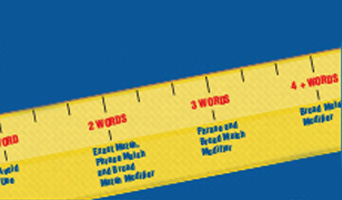 your campaign. Those set of words will control what triggers your enticing ads and get those potential new customers on your site.
your campaign. Those set of words will control what triggers your enticing ads and get those potential new customers on your site.
Let me share an anecdote from a real campaign I manage:
Let’s call my Client Sandy’s Computer Shop. Sandy offers computer repair and upgrade services in a 25 miles radius. In an attempt to drive more traffic for computer upgrades, she included the keywords “computers” and “memory”.
It is not only necessary to do thorough research of what keywords to include based on your main goal but also to carefully select which match types you’ll use the keywords in. This can become quite puzzling at times, especially if you are new to AdWords.
Below, I’ve included some parameters you can use to determine the match type to use based on the keyword’s length.
1 Worded Keywords: Exact & Phrase Match
One-worded keywords (in general) should NOT be part of your keyword listing. Simply using a stand-alone word can associate so many subjects, products and services that it will most likely generate mostly irrelevant traffic, lower CTR and higher costs.
Here is an illustration from Sandy’s Computer:

Notice that “memory” has 4,861 impressions and 5 clicks, plus the CPCs are way higher. “Computer” & “Computers” add up 12,689 impressions and 3 clicks.
Now… wondering what triggered those 8 clicks?
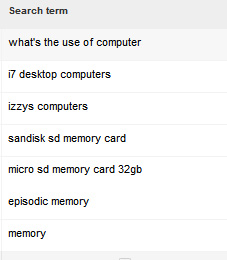
All highly-unrelated searches: Queries for basic information. Perhaps someone looking to buy micro SD cards and even searches for “episodic memory”. Perhaps Izzy’s Computers – a competitor, is the most relevant of the list.
I bet if we saw what the other 17,367 searches are about it would be far more discouraging. In a nutshell, 17,550 impressions wasted for 1 click that was half its worth. We got lower CTR, lower Ad Rank and higher CPCs as a result of 3 one-worded keywords. Still thinking about adding a 1-worded keyword to your list? I’d say think again.
There are instances where you should include 1-worded keywords. For example, most people searching for Locksmith Services just type Locksmith. In cases like this, where you know with certainty a 1-worded keyword needs to be included, then make sure you only add it in exact and phrase match.
It is good to use phrase combined with exact match for 1-worded keywords in such cases. Using exact only will allow you to reach a very relevant but also very narrow audience. Phrase will ensure you have a more extensive reach.
Examples:
[taxi] – Will trigger your ad only if someone types Taxi and nothing more.
“taxi” – Will trigger your ad if a person types: taxi, airport taxi, taxi to Peoria, Annandale taxi, taxi from Bayside, taxi from… and so on.
Note: I once saw in an inherited campaign the keyword T. Yes! The letter “t”. I have no idea why anyone would use such a keyword. But definitely 1-syllable keywords are out of the question.
2 Worded Keywords: All Match Types Apply
2-worded keywords work well in all match types. They tend to be the best choice for starting campaigns because they allow for experimentation and expansion.
If the keyword has high search volume and is very specific, then you can add it only in exact.
BMM and phrase on 2-worded keywords are useful if you are looking into expanding or finding new keyword variations.
An Example: +catering +ogden.
Using BMM in this particular case, helped identify the type of catering services which are most in demand in that specifc area. The keyword above triggerd ads for searches like pulled pork ogden catering, ogden ut catering, catering services in ogden, catering companies in ogden utah, catering food ogden, among others.
Tip: You can start conservative, using a small set of 2-worded keywords and a decent budget. Once you identify the best performing 2-worded keywords, you can add variations or local modifiers and make your keyword set even more relevant:
An Example: +kitchen +remodeling
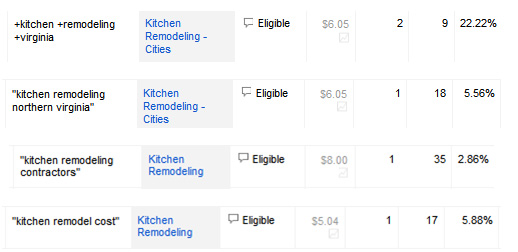
3 – 4 Worded Keywords: Phrase and BMM Are Your Choices
Keywords with 3-4 words tend to be more specific and relevant than 2-worded keywords. But because of their length, if added only in broad match, such keywords could attract too many irrelevant searches even with the proper negative keywords.
Exact on long tail keywords may not drive as much traffic. Use BMM and phrase for 3 to 4-worded keywords in order to capture close variants.
Some Samples:
“Inflatable water slide”: Inflatable water slide rental, rent inflatable water slide, inflatable water slide in Oregon
“cost to finishing basement”: costs to finish basement per square foot
+Utah +county +catering: Utah county catering price, best Utah county catering
+salt +lake +city +catering: Salt Lake City Wedding Catering, Salt Lake City Catering Asian
5+ Worded Keywords: Use BMM Once, and Then Phrase is OK, as Well
As a general rule, use long terms only if they are highly-relevant. No need to use 5+ keywords when you can use 4-worded keyword in phrase match and attract the same searches.
Most likely you will use very long keywords when you take a 3 to 4-worded high traffic keyword and attach a city name to it.
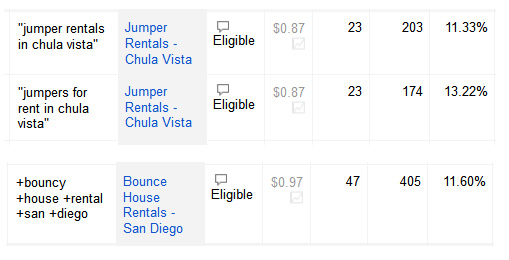
Longer keywords usually tend to perform better in broad match modifier (BMM). Why? Because people are more likely to make a typo and using exact or phrase will not allow you to capture all the good traffic.
Also, even though phrase can be effective when a product or service is very straightforward and you attach a key city or attractive feature to a shorter keyword, phrase match can limit you a bit.
See Illustration:
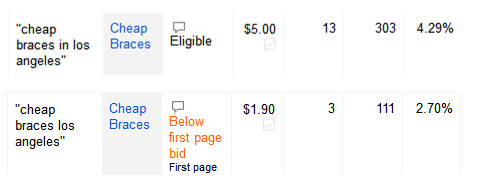 If instead of using either of those 2 terms, you use +cheap +braces +Los +Angeles, you would capture the same traffic the 2 keywords above are getting, and a bit more.
If instead of using either of those 2 terms, you use +cheap +braces +Los +Angeles, you would capture the same traffic the 2 keywords above are getting, and a bit more.
Don’t Use a 5+-Worded Keyword in Exact
Unless you are adding exact 5+-worded keywords from the Search Terms, you can tell the keyword does drive relevant traffic.

7 Takeaways
1. Create Manageable Ad Groups
A good way to determine which match type works best for your keywords, is designing ad groups that contain no more than 20 keywords. This will allow you to identify faster which match type works best.
2. If You Have a Small Budget, Use Exact Match for Keywords with High Traffic
Using high traffic keywords in broad can lead to using up your daily budget too fast, miss on impressions and block other important keywords from driving qualified traffic to your site.
Phrase may still take up too many impressions and clicks in a short time span in some cases.
See Illustrations:
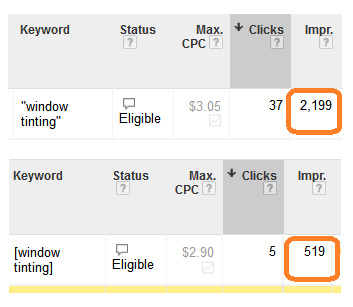
3. Use BMM or Broad for Keywords That Have Very Low Traffic and Are Unique to Your Industry
You will not get irrelevant searches even if terms are in broad match and they apply only to your industry. Be careful… some “industry specific terms” may actually be used in other industries with a totally different meaning. So make sure you do your research.
Some Examples:
- If I use Hypnotherapist NJ in plain broad match, how many other services could this keyword be confused with? None. So it is OK to use it in broad or BMM.
- Insomnia Hypnosis. Here on the contrary, the word insomnia in broad could bring traffic related to pills, herbs and remedies of all sorts to heal from insomnia. You could even get searches about causes and consequences of suffering from insomnia – a total waste of money!
If included in BMM, you will guarantee the search to be more relevant while remaining fairly broad. Some of the searches that +Insomnia +Hypnosis can trigger include:
- hypnosis for insomnia
- insomnia hypnosis
- cure insomnia with hypnosis
- hypnosis and insomnia
- Edging Tool. This is an industry-specific term… for more than 4 different industries. Edging could be related to painting, climbing, landscaping, forging and even sexual techniques. So just image all the random searches you can get if placed in broad. Tool is even broader. Not even adding an extensively long negative keyword list could avoid unrelated searches to trigger your ads. This keyword can work much better in phrase and with a good negative keyword list.
4. Don’t Use All Match Types for 1 Keyword
That will only lead to your keywords cannibalizing each other and higher CPCs.
Add a keyword in 1 or 2 different match types. Based on the data you get, pause the lowest-performing match type. Or, if the originally-chosen match type did not bring the expected results, try another one.
Tip: If you want to test all match types then you could separate your chosen keywords in different ad groups by match type.
For Example:
- [bronze memorial], [bronze memorials], [bronze grave memorial], bronze grave memorials]
- +bronze +memorials, +bronze +grave +memorial

This will allow to determine the ideal bidding by match type and in general identify match type performance per keyword.
5. Above All, Skip Broad Match Completely
Broad could lead to completely unrelated terms triggering the ads.
Let’s take the set of words used in one of the examples above: Bouncy House Rental San Diego. In broad it could capture searches related to house/home rental, houses for sale, home appliances, searches related to famous characters named Diego or other unrelated services in San Diego to name a few.
In all cases, no matter the length of your keywords – with very rare exceptions – avoid using broad match. If you want a wider reach then use broad match modifier (BMM).
6. Think Out of the Box
If your magic formula to determine the match type to use depends on the length of the keyword and it is not working out for you, don’t be afraid to try the “non-recommended” approach. Sometimes you need to follow your gut and play a bit with match type usage.
I have undertaken various campaign creations where I felt we should use XYZ match type for a particular ad group or keyword, when the exact opposite is what’s actually recommended by our internal procedures. Then when I try what my gut told me to begin with, it turns out to work better!
This is rare to happen though and I only recommend following your gut if you have been optimizing accounts for a while and you have allowed enough time for accurate data to accrue in order to make good calls on keyword options to maximize performance.
7. Have a Strategy from the Start
It is not about random testing. Ideally, you should use some parameters to determine the length match type combo and from there make adjustments and test – remember to always have a game plan!






